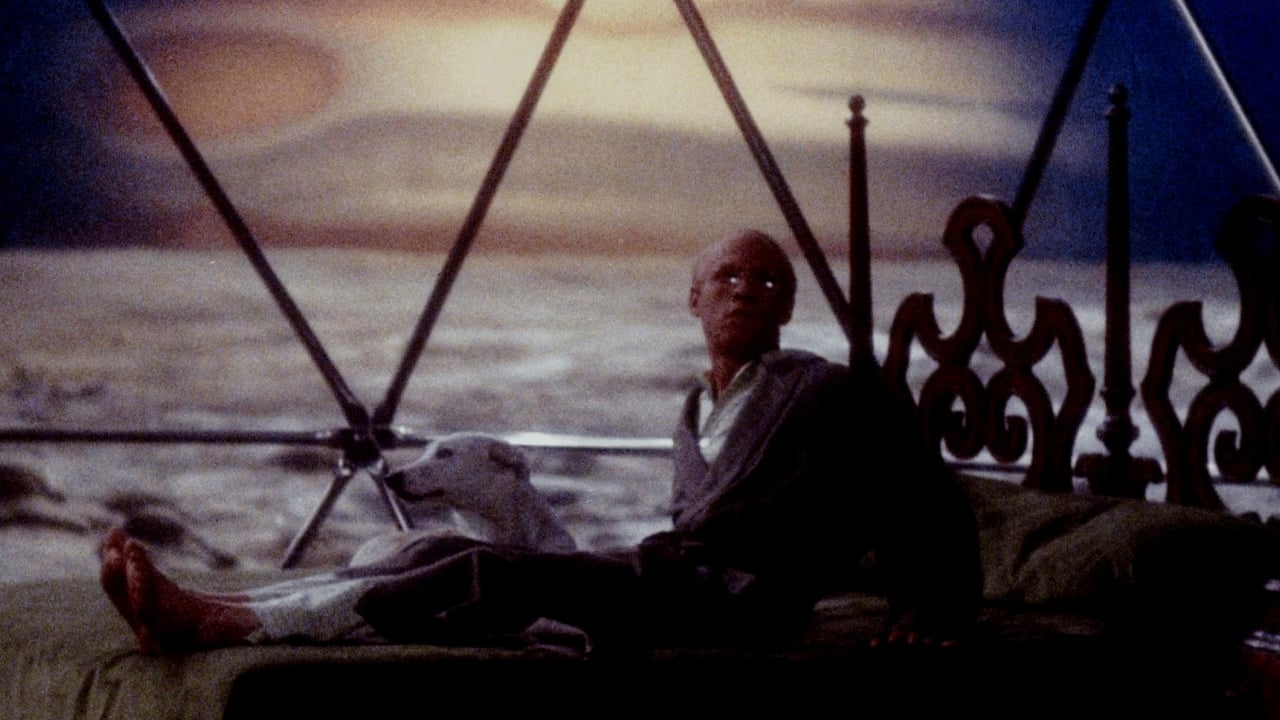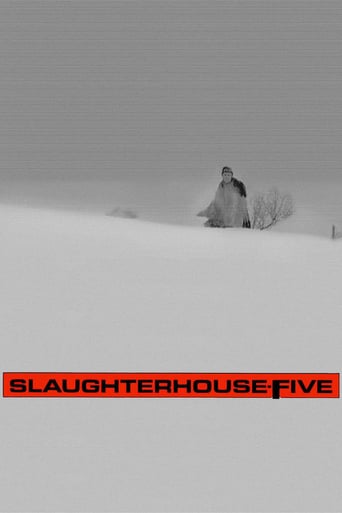Supelice
Dreadfully Boring
Billie Morin
This movie feels like it was made purely to piss off people who want good shows
Edwin
The storyline feels a little thin and moth-eaten in parts but this sequel is plenty of fun.
Allissa
.Like the great film, it's made with a great deal of visible affection both in front of and behind the camera.
realityobserver
If you haven't seen the movie or read the book, put it on your list of to-do things right now.
I read the book in 73, and then watched the movie on late night TV every chance I got.
Lots of drama, comedy (very dark), very satiric, very sad, and very moving portrait of one Billy Pilgrim.
Kurt Vonnegut at his absolute best !
willkommjai
Adapting literature into film can be one of the most difficult things to do. This is simply because of writings individualistic nature and its ability to appear virtually different amongst each person. Director George Roy Hill has pleasantly done so in his film adaptation of Kurt Vonnegut's reading, "Slaughterhouse-Five". Slaughterhouse-Five follows Billy Pilgrim through his family life, the decimated lands of Germany, and faraway lands of Tralfamadore as he is unwillingly stuck in a loop of time travel for reasons unknown. I have twice read the novel and generated a different image each time. Director, George Roy Hill, has shot a wide variety of films ranging from classic westerns (Butch Cassidy and the Sundance Kid, 1969) to corky sports comedies (Slapshot, 1977). Such diversity in directing films leaves the viewer oblivious of what to expect of the time traveling Billy Pilgrim. You can either expect an action packed glorified movie, a humorous one, or a translation more true to Vonnegut's intents within "The Children's Crusade". Other novels/films I'd fit into the same genre as Slaughterhouse-Five would be Tim O'Brien's, "The things they carried". Though no element of time travel is addressed first hand, its purpose is to show the horrors and atrocities of war, done by allies and enemies. The most astonishing part of the movie was its ability to portray every character exactly how I imagined them. Billy Pilgrim is Gumpy and goofy looking, while Paul Lazarro is the Mobster Mentality Maniac the novel makes him out to be. I noticed they used quotes directly from the book which addressed Billy's similarities to German soldiers in the film. "He's a kraut." Having an active interest in history really helps to find a deeper appreciation within the film. Historical accuracies such as setting, race issues, and the time period are all repeated trends through the course of the film. For example, I truly believed I was following troops through Belgium, Luxembourg, and Germany before learning a majority of the film was shot in Snow- ridden Minnesota. The Dresden scenes were all filmed on location in Prague, Czech Republic which provided a believable European influence to surrounding architecture. The year was 1972 and the films budget was around $3,500,000, essentially they had to work with what was given. This is a factor which I believe separates classic and modern cinematography on scales of positive impression. Another Example I found in the film is the shared hate for the Russians and Communism across all characters. To elaborate, the film truly captures the fear of 'The Red Scare' and growth of communism throughout the long, dragged-on cold war. A scene I felt was rather powerful occurs when the musical Englishmen take in the allied forces for food and care while the Russians watched coldly behind a fence. They are both in Prison camps but only the Russians are being treated as prisoners. This repeat offender is seen again when Michael Campbell Jr. attempts to recruit Billy for the 'Free American Corps' to fight communism. As Billy's son grows he ironically joins the Green Berets to "Fight the communists". In history, interracial infantry units did not exist until the Vietnam War. War Movies such as, The Patriot (2000) and Saving Private Ryan (1998) depict unrealistic comradery between African- American and Anglo-American soldiers. If you are familiar with Kurt Vonnegut, you know his style is abstract and follows no specific formality. He often includes himself in real time as well as characters from completely different stories and novels. Though the overall message of 'war is bad' is captured, there is a lack of Vonnegut himself, no cameos are made. It would make an exciting bit for die hard Vonnegut fans. I would have to side with Vonnegut and say this adaptation is far more than acceptable. It is accurate according to the novel and history. It would be nice to see how Kilgore Trout, the reason behind Billy's spatial thoughts, made him Senile or granted him the ability to time travel. This will forever be locked in the confusing mind of long-lost Vonnegut. 4.5/5
claired-30177
Slaughterhouse-Five (1972)Slaughterhouse-Five, by Oscar Award-winning director George Roy Hill, does a beautiful job of visually depicting the incredibly bizarre, guiltily comical, and thought provoking work of its literary counterpart by Kurt Vonnegut. Billy Pilgrim, a nothing-out-of-the-ordinary World War II veteran played by Michael Sacks, recounts his, and subsequently Vonnegut's, experiences from the war, particularly the horrific fire bombing of the German city of Dresden. The characters of Pilgrim's overweight wife Valencia (Sharon Gans), son Robert (Perry King), and daughter Barbara (Holly Near) all help to create the idea of a normal American family, unmarred by the atrocities of war. Billy's seeming lunacy is a stark contrast to their normalcy. Both the film and book travel through different times of Billy's life, due to his obsession with the Tralfamadorian concept of time, and also his attempt to cope with traumatic experiences by revisiting past events. Although dramatically "time-tripping" through three general periods of time, the movie does manage to convey a chronological progression of happenings, escaping from past stressful or violent circumstances to dwell in more peaceful or happier times in the present. In the war, Billy, then serving as a chaplain's assistant, is captured behind enemy lines during the famous Battle of the Bulge, and becomes a prisoner of war. He and the fellow P.O.W.s, including fatherly Edgar Derby (Eugene Roche), vulgar Roland Weary (Kevin Conway) and bloodthirsty Paul Lazarro (Ron Leibman) are shuffled into a German prisoner of war camp, and then packed like animals into train cars bound for Dresden, Germany. Once in Dresden, they are introduced to their new home, and the novel's namesake, Slaughterhouse-Five, an abandoned slaughterhouse sixty feet underground. Throughout the movie, one may observe that much of the music used is upbeat classical music, a stark contrast to the brutal background of war. The entire soundtrack consists of six pieces by Johann Sebastian Bach, which created what felt to me like an ironic tone. The music helps to transfer over Vonnegut's feeling of uncomfortableness that he creates in the novel. Also in the movie there are scenes where the sounds from one scene of Pilgrim's life are imposed on or intertwined with the sounds from another time. One instance of this is near the very beginning of the film when Billy sits at a typewriter, documenting his experiences on Tralfamadore. Each plunk of his finger on a key reverberates as a sharp gunshot and as he continues to type the sounds transform into an entire war scene and we have time-tripped into Billy's past. Right off the bat, I was wary of a film version of such a hauntingly strange novel, but after watching it I feel that George Roy Hill really managed to accurately create an incredible film based off an equally incredible book. Superior acting, a beautiful sound track, and thought- provoking characters and situations all combine to create a film like no other.
Cosmoeticadotcom
While the film falls shy of greatness, it certainly did deserve the awards it won, such as the Prix de Jury (3rd Place) at the 1972 Cannes Film Festival. And, given how many films from the 1960s and 1970s have been pigeon-holed, due to their cultural limitations, it's refreshing to see a film that reflects its era- the 1940s through 1970s, yet does not wallow in it. While one can argue with the film's philosophical posit that everything is connected and predetermined, the presentation, or the art, of the ideas, is excellent. On a personal level, one of the things I find most refreshing about this film is how there is not a single character in it that looks like a movie star. All the main and supporting character roles are played by average looking actors. I sometimes just get tired of looking at films where, even if good acting is involved (such as the films of a Michelangelo Antonioni or Federico Fellini, much less the schlock that Hollywood cranks out), the people all look like perfect mannekins. Another refreshing thing about this film is that it's one of the rare examples of a film (especially considering it was a big studio Hollywood film) set in World War Two era Europe that has nothing to do with the Nazi genocide of European Jews. It's simply next to impossible to make a film on the Holocaust that does not fall into terminal PC preachiness. This film, however, shows the war from a unique perspective; one where humor and the flaws of individuals are on full display, rather than the stridency of a political ax to grind.Slaughterhouse-Five may or may not be a great film (I vote no), but it is a film worth watching. While it does not break as much ground in its art form as its source material does in its, it is a film that sticks with the viewer, forcing one to cogitate upon what it has imparted, Whether or not that means one is time tripping like Billy Pilgrim is up for debate.'Poo-tee-weet.'

